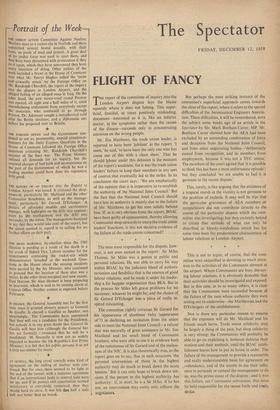—Portrait of the Week— The DIRECT ACTION Committee Against Nuclear
Warfare went to a rocket-site in Norfolk and there committed several brutal assaults, with their faces, on pools of mud and cement. A great deal of no undue force was used to eject them, and they have been threatened with prosecution if they do it again, which they have announced they have every intention of doing. Other m8Ides of the Week included a brawl in the House of Commons over what Mr. Emrys Hughes called the 'mean arid cowardly attack' by the Foreign Office on Mr. Randolph Churchill, the report of the inquiry into the dispute at London Airport, and the alleged foiling of an alleged coup in Iraq. On the Other hand, the new motor-road round Preston Was opened, all eight and a half miles of it, amid overwhelming enthusiasm from everybody except the motorists, who continued to go through Preston. Dr. Adenauer caught a metaphorical cold after the Berlin elections, and a diplomatic one before his proposed visit to Britain.
THE FOREIGN OFFICE and the Government con- tinued to act as, presumably, unpaid circulation- boosters for the Daily Express. Questions in the House of Commons followed the Foreign Office statement criticising Mr. Randolph Churchill's account Of the Suez war. The Prime Minister refused all demands for an inquiry, but the renewed charges of bad faith and incompetence on the part of the Government of which he was a leading member could have done his reputation little good.
THE REPORT OF AN INQUIRY into the dispute at London Airport was issued. It criticised the shop- stewards, particularly Mr. Maitland and the other Communist henchmen, as well as the manage- ment, particularly Sir Gerard D'Erlariger. A picture of all-round muddle and carelessness emerges, with highlights on the drift into appease- ment by the marittgernent 'and the , drift into surrender by the union. The management-hastened to say that they would take note of the report, but the union seemed to regard it as calling for no further efforts on their part.- *.
111E MOST MARGINAL by-election since the 1945 election is pending as a result of the death in a car crash of Sidney Dye, Labour member for the constituency containing the rocket-site which demonstrators 'invaded' at the weekend. Ques- tions in the House about the ensuing incidents were parried by the Air Minister, who continued to pretend that the location of these sites was a secret. In the other (less) marginal seat now vacant, East Harrow, Sir Alan Herbert is busy preparing to intervene, which is said to be causing alarm at Central Office. Neither contest is expected before February.
IN FRANCE, the General Assembly met for the first time since it granted plenary powers to General de Gaulle. It elected a Gaullist as Speaker, not surprisingly. The Communists have announced that they will run a candidate for the Presidency, , but nobody is in any great doubt that General de Gaulle will beat him (although the General has not yet formally p.:mounced that he will be a candidate). M. Soustelle is now not so widely expected to become the 5th Republic's first Prime Minister; it is felt that his mblic persona is as yet a little too sinister for many.
AT GENEVA, the long crawl towards some kind of agreement on the ending of nuclear tests con- tinued. But for once there seemed to be light at the end of the tunnel, with a tentative agreement that if an international body to control tests were set up, and if its powers and constitution seemed satisfactory to everybody concerned, then they would heed its dicta. It was felt that half a stale roll was better than no bread.






































 Previous page
Previous page